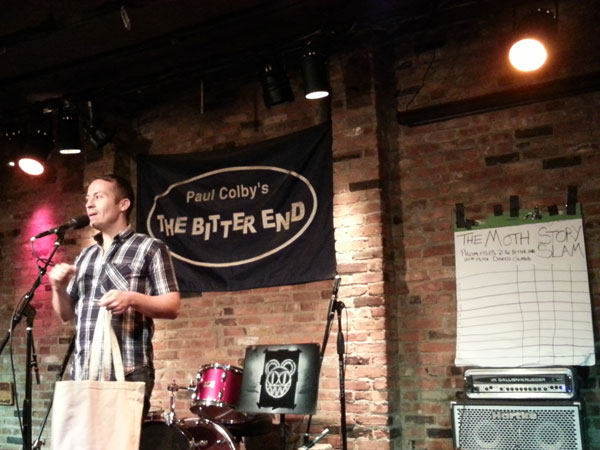
“Release the Moths!” StorySLAM host David Crabb kept the evening moving along with humor and stories of his own, and encouraged the audience to show support for the storytelling contestants.
By HEATHER DUBIN | Everyone loves a good story. Especially the New Yorkers who were willing to stand in a line that wrapped around the block on a recent Monday night to get into The Moth StorySLAM. This installment of the weekly competition was held at The Bitter End on Bleecker St., which has a 230-person capacity and is one of The Moth’s smaller venues.
Right before the show, Robin Wachsberger, associate producer and StorySLAM manager, sat down for an interview about the ins and outs of The Moth. The basic premise at each StorySLAM is that anyone in the audience can put his or her name into a hat in hopes of performing as a storyteller that evening. The host then randomly selects 10 names from the hat, and those lucky brave souls have five minutes to tell a story from their own life that pertains to the event’s theme.
Staff members generate themes prior to the season during a big brainstorming session. They search for broad themes that allow for a variety of interpretations from the storytellers. Fundamental concepts are best, which was exemplified by this particular evening’s theme, “Promises.”
Wachsberger had trouble coming up with a bad theme from past slams.
“We did a location one once — ‘Roof.’ It was weird,” she recalled. Apparently, most of those stories involved sexual escapades.
Themes are posted at the beginning of the season so people can see if there is an intriguing topic ahead or mull over a story they would like to tell. With weekly and monthly slams in 16 cities nationwide, there’s bound to be some repeat.
“We recycle themes, there’s no shame in it,” Wachsberger said.
The event would not be a slam without judges. There are three sets of judges, who are chosen from the audience — some are familiar faces and others are new.
“We also look for those who don’t have a horse in the race,” Wachsberger said. “We look for a team with longstanding knowledge, and we stress consistency.”
Storytellers are not allowed to be judges. Armed with a set of criteria, judges are instructed to look for stories that stay on theme, reflect personal change and stick to the time limit. Like figure skating, judges are given scorecards from 0 to 9. They are encouraged to go no lower than 7.0 since the stories are personal and judging is subjective. And they are told to exercise restraint in awarding a perfect score.
“A 10 means you’ve changed the fabric of our reality, and we try to discourage judges from giving them out liberally,” Wachsberger said.
Judges also need to be mindful that they are not inflating scores after a few drinks.
With so much responsibility, there are still many people eager to be the arbitrators.
Wachsberger explained the nuances of The Moth community, and said there are unspoken codes of conduct against retelling a story or repeating one that has won. But that doesn’t mean everyone adheres to them.
“You can bet people gossip,” she said. “They gossip.”
Ultimately, it’s the judging that makes the regulars care.
“They take the recommendations of good storytelling seriously,” she said.
Winning a StorySLAM has cachet since the final 10 winners of each slam contest compete in a regional GrandSLAM championship. The next one will be at the Music Hall of Williamsburg in Brooklyn on Oct. 23.
The Moth started in 1997, and was founded by George Dawes Green, a poet and novelist who would gather with friends on a porch in Georgia to exchange stories. He brought the idea to New York, first in his living room, and it has grown to include the many venues it occurs in today.
“The Moth came from the poetic image of moth to a flame,” Wachsberger said. “It’s the basic sentiment of listening to stories instead of talking to people.”
The slams have become so popular in New York City that people are usually turned away at the door. They are no longer able to hold events for under 200 people. Even at larger venues like The Bell House in Brooklyn, the slams are packed and not everyone can get in.
Wachsberger was first introduced to a StorySLAM four years ago at the Nuyorican Poets Café in the East Village.
“It was the first event where there was a chance you could get on stage,” she said.
The original content and supportive audience also inspired her. She went back, performed and, as she put it, “became a Moth head.” While she did actually make it all the way to the GrandSLAM, she did not win.
Some people are well rehearsed at slams, while others are a little more impromptu.
“There’s a spur-of-the-moment, metaphoric beauty in the sheer panic of the moment,” Wachsberger noted.
Even though the experience can be raw, Wachsberger was quick to appreciate that there’s “always a positive nugget in the evening.” Although it is rare, when something great comes out of a slam, it can go straight through to programming on “The Moth Radio Hour” on NPR.
Sometimes a celebrity participates at a slam along with the masses.
“It’s super-exciting because of the democracy of a system, you could accidentally have a star-studded evening,” she said.
There were no such sightings at the event at The Bitter End, but David Crabb, the host, was entertainment enough. Crabb got his start as a storyteller, and hosts the StorySLAM on a regular basis. He kept the evening moving with humor and his own personal tales between storytellers. Crabb also made sure the audience was responsive to all 10 participants.
“Everyone wants you to succeed,” Wachsberger noted. “There’s a vulnerability everyone can appreciate.”
Crabb began the night by exclaiming, “Release the Moths!” He explained the rules and told storytellers that their tales must be true and actually have happened to them. A recorder was used to alert storytellers when their time was coming a close.
“At five minutes you will hear a sound, like a wood nymph,” he said. “At six minutes you will hear a more dire sound.”
Crabb reminded the storytellers to stay on theme, and tales of pledges kept and reneged ensued. Participants talked about promises involving a marriage proposal or finding a homeless man a place to live.
The winner was a teacher who told a story about his students and a promise he made to them that ended up with him being bombarded by ice snowballs.
Sloan Crawford and Kate Fagan, who are roommates in the East Village, were each judges. Crawford loved the responsibility and thought it was “the ultimate distinction.”
Fagan was more forthcoming and revealed private information about her roommate.
“Sloan listens to this every morning when she gets ready to go to work,” she said. “This was a big deal for her.”
Crawford then confessed that she listens on NPR to “This American Life” — another popular storytelling show — on Mondays, and “The Moth” Tuesday through Friday.




































